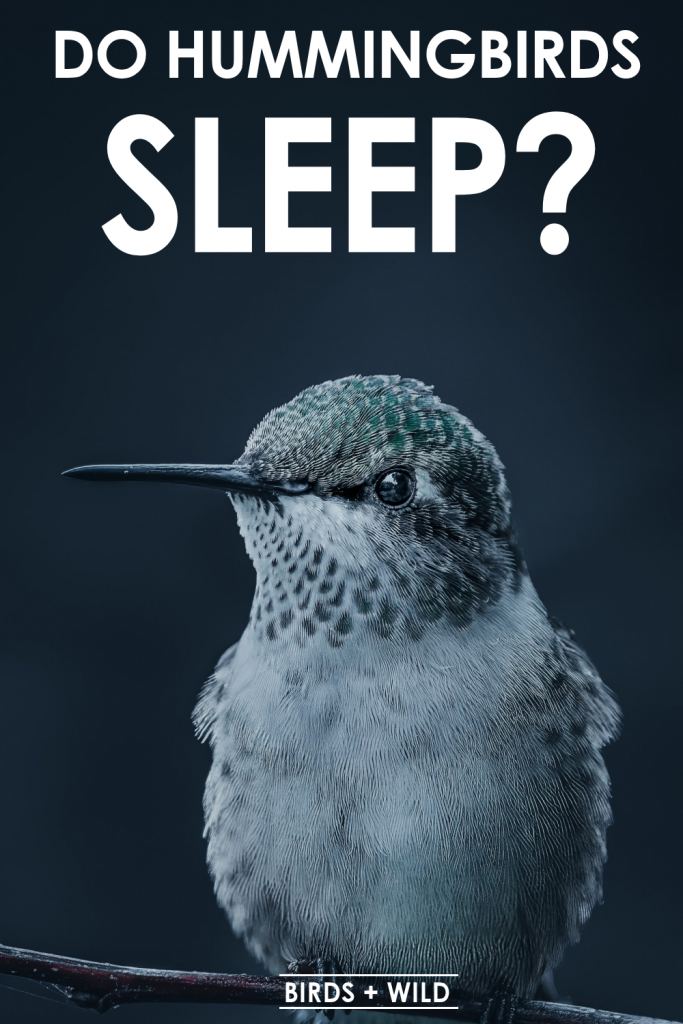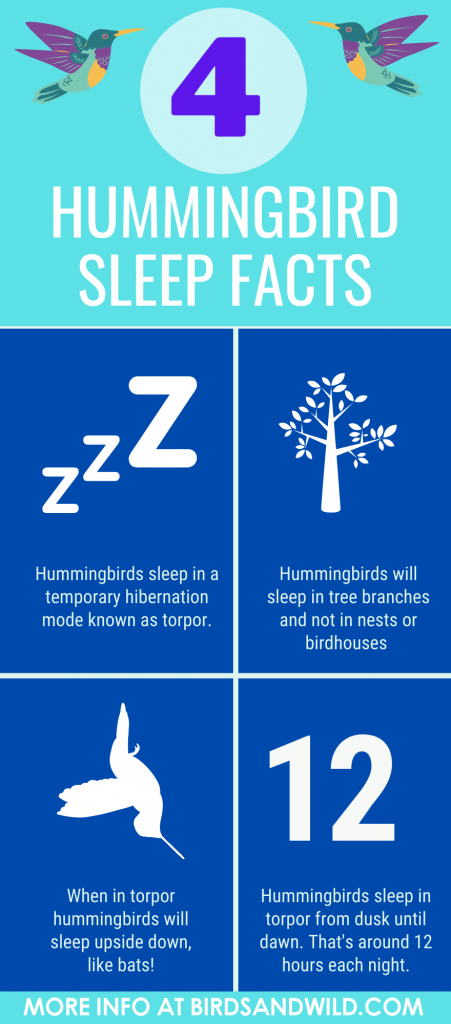Do hummingbirds sleep?
Well, that’s a great question.
Hummingbirds do sleep. All birds need some sleep activity to survive. Hummingbird sleep is known as torpor, which is a type of hibernation. Torpor allows hummingbirds to save energy by slowing down their heartbeat, metabolism, and respiration rate. A hummingbird in a torpor state will be seen hanging upside down on a branch.
Sleep helps birds rest and recover from a busy day of sourcing food, nest building, avoiding predators, and caring for chicks.
But don’t stop reading there!
Birds don’t sleep like us humans, or other animals do.
What does that mean?
Hummingbirds have some fantastic sleep behaviors that you’ll love to learn about. And you’ll learn everything you need to know about hummingbird sleep in this guide, from the where, how’s to what’s and when’s.
Ready? Let’s go.
Pin for Later

Do hummingbirds sleep?
Sleep is an essential behavior for an active bird like a hummingbird. Hummingbirds are constantly moving when they are awake.
But that talent means that sleep is essential. Birds simply don’t have the energy to go without sleep.
But hummingbirds don’t sleep. Well, not sleep as we know it anyway.
The cool thing is that Hummingbirds have a particular type of sleep known as Torpor or noctivation.
What is hummingbird torpor?
It’s extremely deep sleep, kind of like coma or hibernation mode.
Torpor will cause hummingbirds to slow down and shut down.
Their metabolism and body temperature will lower. Plus, their breathing and heart rate will drop to levels so low that you might think they are dead.
But why would they need to do this?
Being a hummingbird requires a lot of energy.
And so torpor is essential for hummingbirds to save energy as much energy as possible.
It’s thought that hummingbirds can save between 60-90% of their energy by using a torpor state.
How do hummingbirds sleep?
One of the things I love about a sleeping hummingbirds is how funny they look.
If you ever encounter a hummingbird in torpor, you may even mistake them for being dead.
Wait! What?
Torpor causes such a state of relaxation that it causes the hummingbird to hang upside down as they sleep, just like a bat.
They can also remain upright, but with their head bent so far back, it looks like their neck is broken.
It’s pretty cool to see.
Just remember, don’t touch them; they are just asleep.

Where do hummingbirds sleep?
A hummingbird will prefer to sleep on the branch or twig of a tree.
You’ll find they choose a safe tree which provides them with a bit of shelter from poor weather conditions.
They tend to choose trees with spaced-out branches such as oak or birch. The large leaves keep them well hidden.
That’s quite usual as most birds like an enclosed space to hide from predators as they rest.
As they sleep, the need for space is likely to allow hummingbirds space to go into torpor quickly.
Yet, hummingbirds sleep in open spaces like a wire or nectar feeder.
Do hummingbirds sleep in nests?
As a general rule, no.
But.
During the breeding season, you’ll find those female hummingbirds will roost over nests.
They will sleep in the nests to incubate the eggs. This helps keep hatchlings and nestlings warm when they have no feathers.
Male hummingbirds don’t care for the chicks, so you’ll never find them sleeping in a nest.
Do hummingbirds sleep in birdhouses?
IF you’ve put up a birdhouse in your yard, hoping it will attract hummingbirds to nest, I’ve got some bad news.
Hummingbirds hate sleeping in small spaces, so a birdhouse is not ideal.
You won’t ever entice a hummingbird into your birdhouse, no matter how much you change the box size, shape, or hole.
How long do hummingbirds sleep?
Hummingbirds will go into a state of torpor from dusk until dawn.
That means the length a hummingbird spends in torpor can be 8-16 hours. Of course, this will depend on the seasons.
On average, it’s around 12 hours of inactivity each night.
The presence of sunlight triggers the hummingbird’s hormones (corticosterone). This causes them to slowly wake from a torpor state.
It can take a hummingbird around 20-60 minutes to rouse from a state of torpor.
Other factors that affect the length of torpor for a hummingbird are:
- Species type and size
- Defending territory (usually dominant males)
- Escaping predators
- Bad weather conditions
- Scare food supply

How often do hummingbirds sleep?
Hummingbirds will go into a state of torpor once a day.
Because it takes so long for hummingbirds to recover from torpor, they can’t just quickly take a quick nap to rest.
When you think about it, the recovery time from a nap will take longer than the actual nap. Poor recovery from torpor can be deadly for hummingbirds.
Plus, each period of torpor puts hummingbirds at increased risk of predators.
Does a hummingbird sleep during the day?
Hummingbirds are active during the day, so the general answer to this question is no.
But that doesn’t mean you won’t see a hummingbird in torpor during the day.
If you see a bird in torpor during the day, it’s not a good sign.
Usually, the bird has had to go into an emergency torpor state to conserve energy.
This will usually be when food is scarce, or bad weather conditions make it too risky to search for nectar.
Do hummingbirds sleep together?
Hummingbirds like to sleep alone.
They are solitary birds, and their sleep behavior has enabled them to sleep alone.
The effects of torpor mean that a hummingbird doesn’t need to depend on the body heat of other hummingbirds to survive as they sleep.
The only time hummingbird will sleep together is when a mother bird raises her chicks in the nest.
Where do hummingbirds sleep in the winter?
Most hummingbirds will migrate to warmer countries over the winter.
That’s because winter means no flowers to collect a food source from.
Most species will migrate to South America or the Caribbean in winter.
Hummingbirds that don’t migrate over winter will sleep in their usual places. However, it will likely be close to a good food source like a hummingbird feeder in your yard.
If you see a hummingbird over winter, keep your nectar feeder well-stocked to give them a good chance of survival.

8 Quick Hummingbird sleep FAQ
These answers are handy to answer direct questions quickly if you’ve not had time to read the whole guide.
What time do hummingbirds go to sleep?
Hummingbirds will go to sleep (torpor) at dusk. This is usually within 30 minutes of the sun setting at night.
What time do hummingbirds wake up?
Hummingbirds wake at dawn when the sun rises.
Hormones trigger a state of waking around 1-2 hours before the sun rises. This gives them time for a torpor transition which can take up to 1 hour for some hummingbirds.
Do hummingbirds sleep at night?
Yes, hummingbirds go into a sleep state known as torpor during the night.
They’re diurnal birds, which means they are primarily active during the day.
Hummingbirds are not nocturnal birds.
If you’ve seen a hummingbird at night, it’s usually due to 3 reasons:
- It’s just dark, and they’re winding down
- They’re migrating
- They’re disorientated by artificial lights.
Do hummingbirds take naps?
No hummingbirds don’t take naps.
They can’t take naps because they only have two states: active or torpor.
Torpor is a problematic state to recover from. Longer, scheduled periods of torpor are better than short, frequent periods.

Do hummingbirds sleep upside down?
Yes, they do.
The state of torpor causes them to go into a relaxed state which causes them to sleep upside down.
Do hummingbirds sleep with their eyes open?
When in a torpor state, a hummingbird will have its eyes shut.
A hummingbird that looks like it is sleeping with its eyes open is usually not in a complete state of torpor. It can also be waking from a torpor state.
Do hummingbirds sleep in the same place each night?
Yes. Hummingbirds tend to find a safe space they like to sleep in and return there each night until they migrate.
Hummingbirds are very territorial birds. A good sleeping area is usually very safe from predators and close to a good food source. Both of these needs are essential for hummingbird survival.
Do hummingbirds leave their nest at night?
Female hummingbirds will leave their nests at night as their chicks get older.
Usually, this won’t be until they have feathers to keep themselves warm.
During nesting season, female hummingbirds survive without a daily period of torpor while protecting their chicks.
Final thoughts
Yes, hummingbirds sleep, but in an energy-saving state known as torpor.
They switch all their body functions to low, including their heartbeat, temperature, and breathing.
This behavior helps them save vital energy for their busy days of hunting for nectar.
Hummingbirds tend to sleep, hidden in tree branches, once a day from dusk until dawn.
Survival is the main aim of hummingbird sleep.
I hope this hummingbird sleep guide has answered any questions you have. And if it hasn’t, just ask below, and I’ll help you answer it.


We have hummingbird feeders in our oak tree that we love to watch come & go. I had looked up earlier the difference between male and female hummingbirds because we have a pair right now. We only seem to see this pair and no other hummingbirds, is this normal? Your article was great and very easy to understand. Thank you
Hi Deborah,
I’m glad you found the article useful. It can be quite unusual to see a migrating pair together at this time of year as the males usually migrate ahead. However, if it’s an overwintering species of hummingbird, you may be lucky enough to have them stay all winter. Just be aware that the male may be bullying other hummers who attempt your feeders, your may find my guide on how to prevent bully hummingbirds useful.
We live in central Washington State, some hummingbirds stay year round. We had a pretty good cold spell where temperatures dropped to 10 degrees. We keep feeders handy on our deck, noticed a hummer perched on top of our window near feeder in Torpor state. It hasn’t moved going on two weeks now. Temperatures came up after just a couple of days of it being there. What should I do?
Appreciate any advice.
Hi Reggie,
It’s best to leave the hummingbird to wake from torpor itself. The waking process can take up a lot of energy and is a dangerous process if supplies are low. Keep your feeders out as the food supply will be vital to its survival once it wakes and needs more energy to survive until nectar supplies are plentiful in early spring.
I love in az. There is a humming bird nest in my back yard, the babies look like they are getting ready to leave the nest. They are doing fantastic, the mom is excellent!!!! But iam worried about feral cats!!! I saw three on the fence. Should I be worried for them?
Hi Patti, unfortunately, cats are a big problem for wild birds. Feral cats are even harder to control than domestic cats. You may want to think about using a deterrent spray such as this Orange Oil. The smell may help to keep the cats away from the tree, whilst the fledglings are learning to fly.
I live in an apartment at the rear of the complex with a small lawn and tall wall separating us from a housing development. I have a small patio off my bedroom with a small sparse bush next to it. For the first two years I was privileged to have a female hummingbird hangout on that bush quite often and fly up to me. This year I have a male. He spends a great deal of time on the bush and has no fear of me. Amazing!!
Sound amazing Vicky, and I’m glad to hear you getting your little piece of nature in a built-up area.
One of my hummingbirds got into my garage today. I couldn’t shoo it out. I came home tonight and the bird was clinging to a wire in the ceiling. It wasn’t moving. I got on a ladder and had to pull it off the wire. I was as gentle as I could be. I took it outside and it flew away and went to a tree that they like. This was right at dark. I’m hoping it was just sleeping. I love my birds and after reading about how important it is for them to slowly wake up, I’m praying I didn’t harm the little fella. Do you think it will be OK? Thanks
I m in a new place and put out my hummingbird feeder this spring then noticed I had quite a few hummingbirds so I bought a new feeder that I had researched and hung it on the other side of the porch. They didn’t go to it so I hung it closer to the old one. Nothing. The new one looks almost identical to the old one and has the same mixture in it.
Hi Paula,
My advice is to be patient. You’ll find that when one hummingbird starts to feed from the new feeder, you’ll get a whole bunch of them feeding from it. Sometimes birds are a bit weary of a new feeder until they realize it’s a great food source and keep coming back again and again. Remember, some Hummingbird species will be starting to migrate south for winter, but keep your feeder out for 2 weeks after you see your last hummingbird feeding.
I have noticed a few of my hummingbirds seem to while drinking, just stop & act like they are sleeping. Leaning way over, almost falling out. Is this normal. We are in our “hot” season, does this have anything to do with this behavior? Thank You